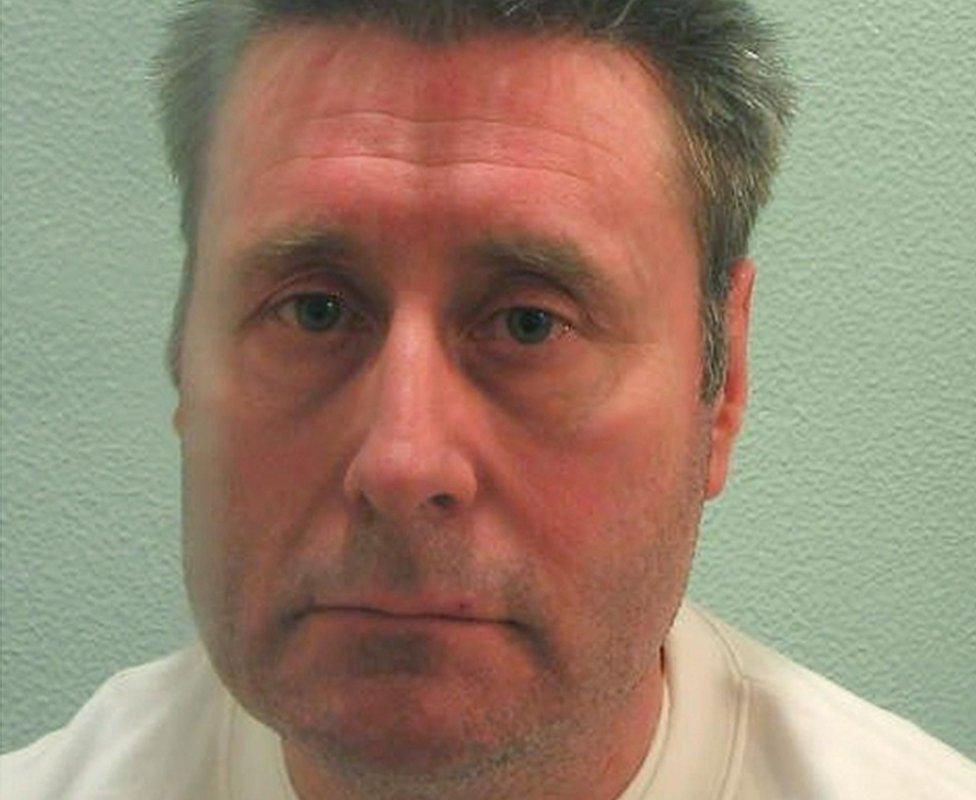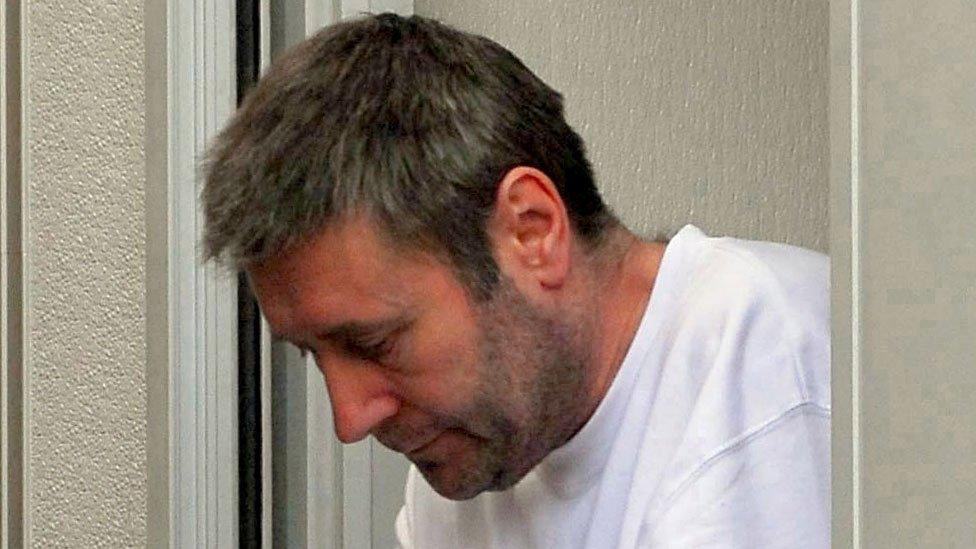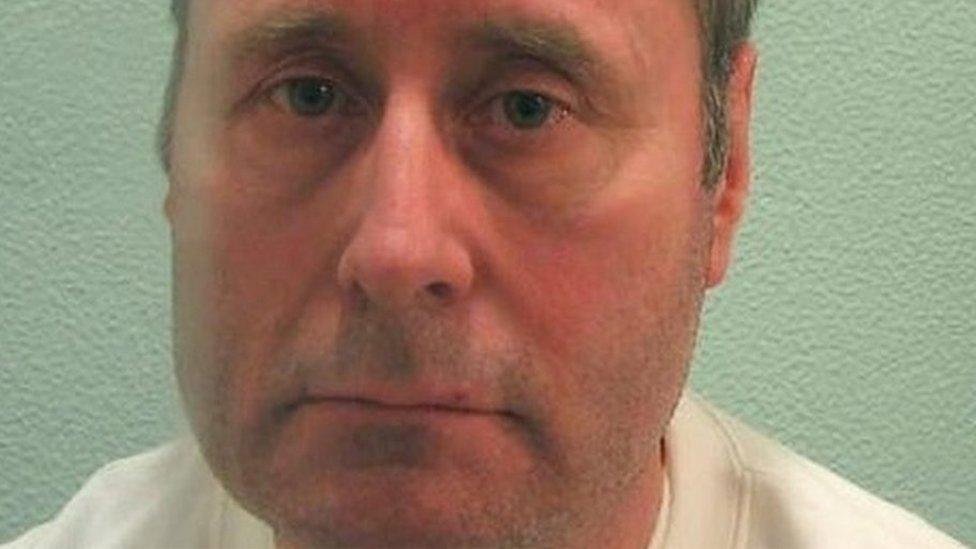John Worboys release will not be challenged by government
- Published
Justice Secretary David Gauke says there will not be a judicial review
The government will not challenge the decision to release rapist John Worboys, the justice secretary says.
David Gauke said "it would not be appropriate" to seek a judicial review of the Parole Board's ruling to free Worboys after less than 10 years.
Victims as well as the mayor of London are seeking a judicial review. The Parole Board has said it is "confident correct procedures were followed".
Worboys, 60, was jailed in 2009 for assaults on 12 women in London.
Mr Gauke said there would be a wider review of how the Parole Board deals with victims.
The government had been considering the possibility of a legal challenge to Worboys's release, but the justice secretary said that, after consulting lawyers, it would not be appropriate for him to proceed.
He said: "I know this will disappoint the victims in this case and members of this House given the crimes for which he has been convicted.
"On a personal level, candidly I share those concerns."
He added his decision should not stop others from making their own legal challenge.
"Let me be absolutely clear, Worboys will not be released until his victims' representations have been properly considered and his licence conditions are in place."

Worboys gave his victims drug-laced champagne before he attacked them
At his trial, the court heard how Worboys gave his victims drug-laced champagne, claiming he was celebrating a big lottery win.
The former black cab driver was given an indeterminate sentence of imprisonment, with a minimum term of eight years, for public protection.
Prosecutors believe Worboys - who changed his name by deed poll to John Radford - may have carried out more than 100 sexual assaults and rapes on women in London between 2002 and 2008.
Victims' groups and representatives were outraged by the news of Worboys's imminent release earlier this month, saying many were not informed before it was made public.
In response to the justice secretary, two women - a victim and a second woman who says Worboys attacked her in 2003 although her complaints never reached court - said they intended to move forward with judicial review proceedings next week.
They said, in a letter to the Parole Board on 16 January, he "remains a danger to women and that everything should be done to stop his imminent release".
They are crowdfunding their action and have received more than £25,000.
Lawyer Richard Scorer, from the firm Slater and Gordon which represented 11 victims in civil cases against Worboys, said his clients were "disappointed" at the government's decision, but would go forward with the victim judicial review.
"It is crucial that the decision to release this manipulative, calculating and dangerous man can be considered by the courts as soon as possible."
Shadow justice secretary Richard Burgon called for an independent review of the case, saying it raised "many serious questions" and urging the government to "restore public confidence in our justice system".
'Perverse and appalling'
Labour's London Mayor Sadiq Khan said he would seek a separate judicial review, adding: "I am deeply concerned and unhappy about the prospect of John Worboys's impending release.
"At the very least his victims and Londoners need the Parole Board's decision to be properly scrutinised by the courts. I will do all I can to ensure this happens."
Conservative MP and former mayoral candidate Zac Goldsmith praised Mr Khan, external for "taking the initiative" against a "perverse and appalling" decision.
But former prisons minister Crispin Blunt said Mr Gauke had "rightly resisted the temptation to do a populist thing which would have been wasteful of taxpayers' money", as a legal challenge from government would have had no reasonable prospect of success.
The Parole Board said it welcomed the review into how it deals with victims.
"We think this is a sensible course of action to take to make sure that the public and especially victims have confidence in the Parole Board's work."
What is a judicial review?
A judicial review is where a judge reviews the lawfulness of a decision made by a public body - in this case, the Parole Board.
It is less about whether the decision was right or wrong, and more about challenging whether proper procedures were followed to reach the decision.
How does a parole hearing make its decision?
Hearings consider a number of different factors including whether prisoners have changed their behaviour, where they're going to live and what kind of support network they will have after release, Lucy Gampell, a Parole Board member, told Radio 4's The Briefing Room.
In Worboys's hearing, the panel considered a dossier of 363 pages, questioned Worboys himself, heard evidence from four psychologists and prison and probations staff and were given a written statement from one of his victims.
The final decision is based on future risk - not whether the original sentence was appropriate, Mr Hardwick said.
On what grounds would the government bring a review?
In this case, Mr Gauke said he had two grounds open to him to order such a review: that a decision was one that no Board could reasonably have taken; or that there were significant procedural failings in the way that that decision was taken.
His decision not to go ahead suggests he couldn't prove either, says QC and legal commentator Joshua Rozenberg.
As Mr Gauke said in his statement, the bar for a review to succeed is "very high" and it is unprecedented for a secretary of state to bring a judicial review.
As justice secretary, Mr Gauke can always advise Parliament to change the rules by which the Parole Board works.
Why are victims bringing a judicial review themselves?
It's unusual for victims to challenge Parole Board decisions as - unsurprisingly - most disputes are about prisoners being denied release.
A lawyer acting on behalf of two women who say they were sexually assaulted by Worboys has said they will bring their own review on two grounds: that the Parole Board rules are unlawful in that they prevent the publication of reasons for decisions; and the decision to release Worboys in light of facts surrounding his offence and reports of his progression in prison appears to be wholly irrational.
On the first ground, David Gauke has called on a wider review of the Parole Board which is likely to cover this.
The second ground will be difficult to prove without the publication of the details from the hearing.
Mr Rozenberg said he struggles to see how the the victims would have a better chance of success than Mr Gauke. "Judicial reviews are difficult and rightly so," he added.

Analysis

By BBC home affairs correspondent, Dominic Casciani
We don't know why the justice secretary abandoned a proposed judicial review - but given the Parole Board is sponsored by his ministry, it's rather hard to see how he could challenge its workings if staff in prison supported the release decision.
Judicial reviews are difficult to win. A claimant must prove that the public body acted illegally or took a decision that was so irrational or perverse that nobody else would come to the same conclusion.
The potential judicial review from Worboys's victims is likely to argue that the Parole Board's rules are illegal because there is a clear public interest in revealing the secret reasons for the release decision - but also that whatever those reasons were, they must have been irrational given everything that is known about the serial attacker.
While the Parole Board is a quasi court - arguments are put and judgements are made - its processes are entirely private. Victims and the public can't sit in and listen. In contrast, any of us can go to court and hear the detailed arguments presented to a judge deciding whether or not to jail a criminal.
- Published4 January 2018
